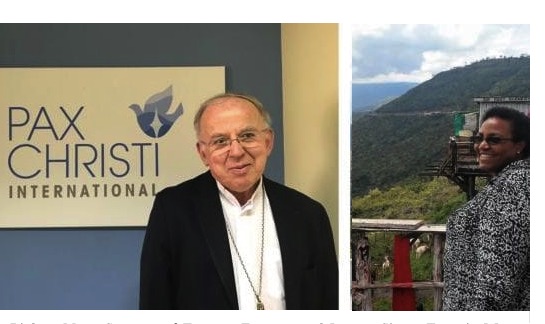EDUCATION FOR PEACE .
An article by Dennis Sadowski from Crux: Taking the Catholic pulse
Pax Christi International has two new co-presidents and while they hail from different continents, they share the view that rampant violence is posing ever-growing danger to the world.
Loreto Sister Teresia Wamuyu Wachira of Nairobi, Kenya, and Bishop Marc Stenger of Troyes, France open their three-year term hoping that the organization can boost training in nonviolence, especially among young people. They see such training as necessary so that eventually dialogue and communication become the prime options to resolve differences rather than the use of hateful words, physical attacks and even warfare.

Bishop Marc Stenger of Troyes, France, and Loreto Sister Teresia Wamuyu Wachira of Nairobi, Kenya, were elected co-presidents of Pax Christi International during the organization’s annual general meeting June 26-27 in Brussels. (Credit: CNS photo/Christi International.)
“Nonviolence is very, very important,” Wachira told Catholic News Servicefrom Kenya. “We have to try. It may take a long time and we may be going against the grain, but I believe we must move in the right direction.”
Stenger wrote in an email that the organization “can open avenues and provide guidance for promoting sustainable peace through nonviolent strategies.”
(Article continued in the right column)
Can peace be guaranteed through nonviolent means?
(Article continued from the left column)
“It can do this,” he explained, “in connection with the infrastructure available to the Church at all levels – universities, seminaries, dioceses, etc. – stressing the social teaching of the Church, always to be read in the light of the Gospel.”
While starting their term during Pax Christi International’s annual general meeting June 26-27 in Brussels, the co-presidents had yet to formally meet face-to-face. Wachira was unable to attend because of visa issues. But both said they have talked via online video conferencing and were eager to move forward on the organization’s priorities addressing nonviolent alternatives.
Both peace leaders have promoted nonviolence in their ministry roles. Wachira has been a teacher and principal in Loreto-run schools in the East African nation, concentrating on training young women for peacemaking and reconciliation work.
She also advises her congregation’s office at the United Nations in New York on the role of peacemaking in the world’s trouble spots.
Stenger for years has written on nonviolence and the importance of building a culture of peace in local communities. His involvement with the Catholic peace organization dates to 1999, when the French bishops’ conference proposed he become president of that country’s Pax Christi body.
The bishop also has addressed the precarious situation of Christians in Iraq, and after a 2002 visit to Colombia, which then was in the midst of a long-running civil war, he called on all parties to respect human rights in order to achieve peace.
In his email, the bishop expressed concern that the world’s nuclear powers are seeking to expand their nuclear weapon arsenals after decades of reductions. Plus, he said, the widening distribution of conventional arms is destabilizing societies and increasing injustice in many nations, causing people to flee for safer lands.
Stenger has been a leading voice in the French Church on the role of people of faith stepping up to protect the environment. He has repeatedly called for strong global action to address climate change.